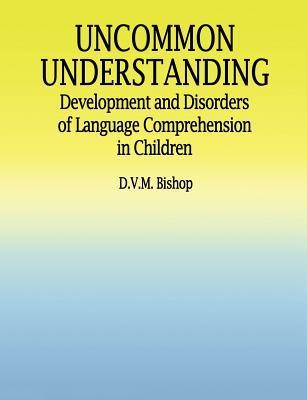
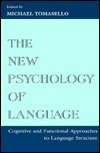
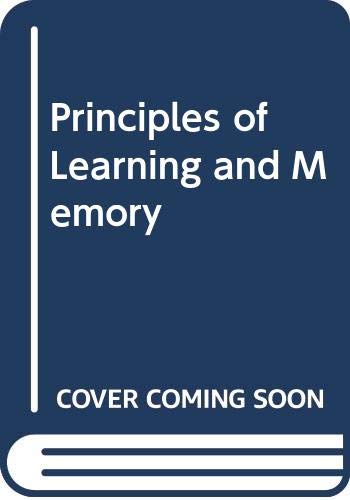
Psychology Press & Routledge Classic Editions
Series · 17
books · 1974-2021
Books in series

#6
Uncommon Understanding
1998
A great deal has been written on how children learn to speak, but development of language comprehension has been a relatively neglected topic. This book is unique in integrating research in language acquisition, psycholinguistics and neuropsychology to give a comprehensive picture of the process we call "comprehension", right from the reception of an acoustic stimulus at the ear, up to the point where we interpret the message the speaker intended to convey by the utterance. A major theme of the book is that "comprehension" is not a unitary to understand spoken language, one needs the ability to classify incoming speech sounds, to relate them to a "mental lexicon", to interpret the propositions encoded by word order and grammatical inflections, and to use information from the environmental and social context to select, from a wide range of possible interpretations, the one that was intended by the speaker. Furthermore, although neuropsychological and experimental research on adult comprehension can provide useful concepts and methods for assessing comprehension, they should be applied with caution, because a sequential, bottom-up information processing model of comprehension is ill-suited to the developmental context.
The emphasis of the book is on children with specific language impairments, but normal development is also given extensive coverage. The focus is on research and theory, rather than practical matters of assessment and intervention. Nevertheless, while this book is not intended as a clinical guide to assessment, it does aim to provide a theoretical framework that can help clinicians develop a clearer understanding of what comprehension involves, and how different types of difficulty may be pinpointed.

#7
The New Psychology of Language
Cognitive and Functional Approaches To Language Structure, Volume I
1998
This book, which gathers in one place the theories of 10 leading cognitive and functional linguists, represents a new approach that may define the next era in the history of psychology: It promises to give psychologists a new appreciation of what this variety of linguistics can offer their study of language and communication. In addition, it provides cognitive-functional linguists new models for presenting their work to audiences outside the boundaries of traditional linguistics. Thus, it serves as an excellent text for courses in psycholinguistics, and appeal to students and researchers in cognitive science and functional linguistics.

#11
Principles of Learning and Memory
1976
First published in 1976. Routledge is an imprint of Taylor & Francis, an informa company.

#13
Attention and Emotion
A Clinical Perspective
1994
This text critically reviews the literature on attention and emotion, and offers an integrative cognitive attentional model of the development and maintenance of emotional disorders. It highlights the similarities and differences between disorders and offers specific new treatment implications. The book contains numerous summary sections so that readers less familiar with the cognitive literature can follow the main issues without being overwhelmed. The central aims of this work are: to review critically models of attention and their application to attentional processes in emotional disorders; To develop an integrative theoretical framework and model for conceptualizing attentional processes associated with the aetiology and maintenance of emotional stress reactions; and to discuss the implications for clinical practice of attentional theories of emotional dysfunction.

#16
Factor Analysis, 2nd Edition
1974
Comprehensive and comprehensible, this classic covers the basic and advanced topics essential for using factor analysis as a scientific tool in psychology, education, sociology, and related areas. Emphasizing the usefulness of the techniques, it presents sufficient mathematical background for understanding and sufficient discussion of applications for effective use. This includes not only theory but also the empirical evaluations of the importance of mathematical distinctions for applied scientific analysis.

#21
Romance and Sex in Adolescence and Emerging Adulthood
Risks and Opportunities
2015
In this classic edition top scholars in family research examine the nature and origin of adolescents’ contemporary patterns of sexual and romantic relationships, from the evolutionary roots of these behaviors to policies and programs that represent best practices for addressing these issues in schools and communities. The text offers interdisciplinary expertise from scholars of psychology, social work, sociology, demography, economics, human development and family studies, and public policy. Adolescents and young adults today face very different choices about family formation than did their parents’ generation, given such societal changes as the rise in cohabitation, the increase in divorce rates, and families having fewer children. This book examines these demographic trends and provides a backdrop against which adolescents and emerging adults form and maintain romantic and sexual relationships. This book addresses such questions \What are the ways in which early family and peer relationships give rise to romantic relationships in the late adolescent and early adult years? \How do early romantic and sexual relationships influence individuals’ subsequent development and life choices, including family formation? \*To what extent are current trends in romantic and sexual relationships in adolescence and emerging adulthood problematic for individuals, families, and communities, and what are the most effective ways to address these issues at the level of practice, program, and policy? Ideal as a supplement in graduate or advanced undergraduate courses on interpersonal (romantic) relationships, adolescent development, human sexuality, couples and/or family and conflict, sociology of children and youth, family therapy taught in human development and family studies, clinical or counseling psychology, social work, sociology, communications, and human sexuality this book also appreciated by researchers and clinicians/counselors who work with families and adolescents.
#22
Couples in Conflict
2001
This vol investigates couple conflict, in both it's damaging & constructive incarnations, with an eye toward its effects on the couples, their families and the broader community. Written by & for family specialists, developmental & clinical psychologists
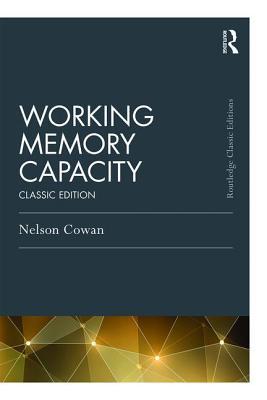
#24
Working Memory Capacity
2016
The idea of one's memory "filling up" is a humorous misconception of how memory in general is thought to work; it actually has no capacity limit. However, the idea of a "full brain" makes more sense with reference to working memory, which is the limited amount of information a person can hold temporarily in an especially accessible form for use in the completion of almost any challenging cognitive task. This groundbreaking book explains the evidence supporting Cowan's theoretical proposal about working memory capacity, and compares it to competing perspectives. Cognitive psychologists profoundly disagree on how working memory is whether by the number of units that can be retained (and, if so, what kind of units and how many), the types of interfering material, the time that has elapsed, some combination of these mechanisms, or none of them. The book assesses these hypotheses and examines explanations of why capacity limits occur, including vivid biological, cognitive, and evolutionary accounts. The book concludes with a discussion of the practical importance of capacity limits in daily life. This 10th anniversary Classic Edition will continue to be accessible to a wide range of readers and serve as an invaluable reference for all memory researchers.
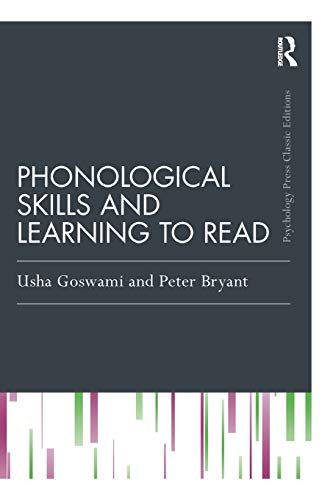
#25
Phonological Skills and Learning to Read
2016
In this classic edition of their ground-breaking work, Usha Goswami and Peter Bryant revisit their influential theory about how phonological skills support the development of literacy. The book describes three causal factors which can account for children’s reading and spelling This classic edition includes a new introduction from the authors which evaluates research from the past 25 years. Examining new evidence from auditory neuroscience, statistical modelling and orthographic database analyses, as well as new data from cognitive developmental psychology and educational studies, the authors consider how well their original ideas have stood up to the test of time. Phonological Skills and Learning to Read will continue to be essential reading for students and researchers in language and literacy development, and those involved in teaching children to read.

#26
The Psychology of Language and Communication
2014
This is a classic edition of Geoffrey Beattie’s and Andrew Ellis’ influential introduction to the psychology of human language and communication, now including a new reflective introduction from the authors. Drawing on elements from many sub-disciplines, including cognitive and social psychology, psycholinguistics and neuropsychology, the book offers an approach which breaches conventional disciplinary boundaries. Exploring the diverse nature of communication, Beattie and Ellis focus on the range of human communicative channels and the variations which occur both between and within societies and cultures. Written from an informative and entertaining historical perspective, The Psychology of Language and Communication remains a key resource for anyone interested in the psychology of communication, language and linguistics, 30 years on from its first publication.

#28
Knowledge in Context
Representations, Community and Culture
2006
This book explores the relationship between knowledge and context through a novel analysis of processes of representation. Sandra Jovchelovitch argues that representation, a social psychological construct relating self, other and object-world, is at the basis of all knowledge. Understanding its genesis and actualisation in individual and social life explains what ties knowledge to persons, communities and cultures. It is through representation that we can appreciate the diversity of knowledge, and it is representation that opens the epistemic function of knowing to emotional and social rationalities. Drawing on dialogues between psychology, sociology and anthropology, Jovchelovitch explores the dominant assumptions of western conceptions of knowledge and the quest for a unitary reason free from the ‘impurities’ of person, community and culture. She recasts questions related to historical comparisons between the knowledge of adults and children, ‘civilised’ and ‘primitive’ peoples, scientists and lay communities and examines the ambivalence of classical theorists such as Piaget, Vygotsky, Freud, Durkheim and Lévy-Bruhl in addressing these issues. Against this background, Jovchelovitch situates and expands Moscovici’s theory of social representations, developing a framework to diagnose and understand knowledge systems, how they relate to different communities and what defines dialogical and non-dialogical encounters between knowledges in contemporary public spheres. Diversity in knowledge, she shows, is an asset of all human communities and dialogue between different forms of knowing constitutes the difficult but necessary task that can enlarge the frontiers of all knowledges. Knowledge in context will make essential reading for all those wanting to follow debates on knowledge and representation at the cutting edge of social, cultural and developmental psychology, sociology, anthropology, development and cultural studies.
#30
Models of Cognitive Development
1998
Beginning with the premise that there remains a diversity of models of what knowledge and reasoning are and how they develop, this text aims to provide theoretical convergence towards a generally accepted set of principles.
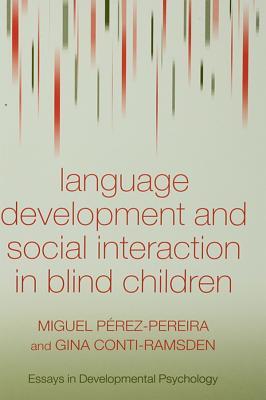
#31
Language Development and Social Interaction in Blind Children
2013
This book provides an up-to-date account of blind children's developing communicative abilities with particular emphasis on social cognition and language acquisition from infancy to early school age. It purports to foster dialogue between those interested in the study of typically developing children and those interested in the development of children who are blind and to provide insights and new explanations of why the development of blind children may differ from that of sighted children. The book also aims to identify and examine current theoretical issues which are likely to be at the centre of developments in the fields of child language and developmental psychology.Language Development and Social Interaction in Blind Children is also a timely book. The study of blind children's development constitutes a unique opportunity to study the effect of vision on development, and more specifically on the development of language and certain aspects of social cognition. Current interest in the development of theory of mind and perspective taking in language learning, make the case of blind children crucial to our understanding of certain aspects of psychological functioning. The book explores these issues, challenges some widely-held beliefs about the development of communication in blind children, and provides a cohesive picture of our knowledge to date.
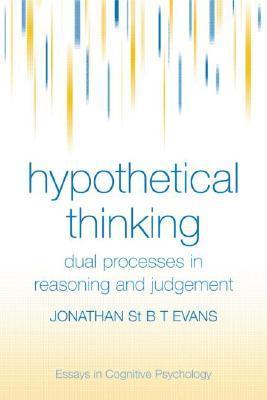
#32
Hypothetical Thinking
Dual Processes in Reasoning and Judgement
2007
Hypothetical thought involves the imagination of possibilities and the exploration of their consequences by a process of mental simulation. In this Classic Edition, Jonathan St B T Evans’ presents his pioneering Hypothetical Thinking Theory; an integrated theoretical account of a wide range of psychological studies on hypothesis testing, reasoning, judgement and decision making. Hypothetical Thinking Theory is built on three key principles and implemented in a version of Evans' well-known heuristic–analytic theory of reasoning. The central claim of this book is that this theory can provide an integrated account of apparently diverse phenomena including confirmation bias in hypothesis testing, acceptance of fallacies in deductive reasoning, belief biases in reasoning and judgement, biases of statistical judgement and numerous characteristic findings in the study of decision making. Featuring a reflective and insightful new introduction to the book, this classic edition discusses contemporary theory on cognitive biases, human rationality and dual-process theories of higher cognition. It will be of great interest to researchers, post graduates as well as advanced undergraduate students.
#34
History of Psychology
A Cultural Perspective
2006
The Instructor's Resource CD, written by the text author, includes class activities and demonstrations, suggestions for small group and class discussions, a list of films and videos related to the material in each chapter, and a test bank with objective and essay questions.

#35
The Psychobiology of Human Motivation
1999
Why is one person motivated to create a business empire whilst another is inspired to produce a beautiful work of art? Why do some people prefer a quiet life?
The Psychobiology of Human Motivation explores what directs our behaviour, from basic physiological needs like hunger and thirst to more complex aspects of social behaviour like altruism. Hugh Wagner explores the limits of biological explanations and shows how humans can influence \`basic' physiological drives in order to adapt to a complex social environment.
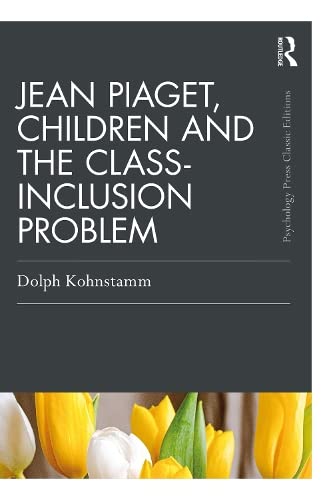
#36
Jean Piaget, Children and the Class-Inclusion Problem
2021
The Classic Edition of Dolph Kohnstamm's Jean Piaget, Children and the Class-Inclusion Problem, first published in 1967, includes a new introduction by the author, describing for readers the original context for his work, how the field has moved forward and the ongoing relevance of this volume.
This enduring text offers a critical study of a cornerstone of Piaget's theory that a child's ability to solve problems of class-inclusion marks the beginning of the period of concrete (logical) operations at about 7 or 8 years of age. Kohnstamm's experiments show, however, that, with a teaching method that provokes children's authentic logical thinking processes, most children of 5 can already learn to solve a variety of class-inclusion problems, up to a level where they can even invent similar but new problems themselves. These results question the basic assumption of Piaget's theory that logical operations can only develop in firmly connected groupings of operations. Kohnstamm argues that experimenters must, therefore, show that children who come to master one kind of operation should also show transference to other operations of the same grouping. This insightful volume questions the real existence in brain functioning of Piaget's families of logical operations. No experimental proof of such families has ever been demonstrated, and thus is solely an assumption in Piaget's theory.
This challenge to Piaget's theory is an invaluable resource for students and scholars of cognitive, developmental and educational psychology.
Authors
Dolph Kohnstamm
Author · 2 books
Geldolph (Dolph) A. Kohnstamm is a child development psychologist and essayist. From 1973 to 1998 he was a professor at Leiden University.
Dorothy V.M. Bishop
Author · 1 book
Dorothy Vera Margaret Bishop is Professor of Developmental Neuropsychology and a Wellcome Trust Principal Research Fellow at the Department of Experimental Psychology at the University of Oxford.
